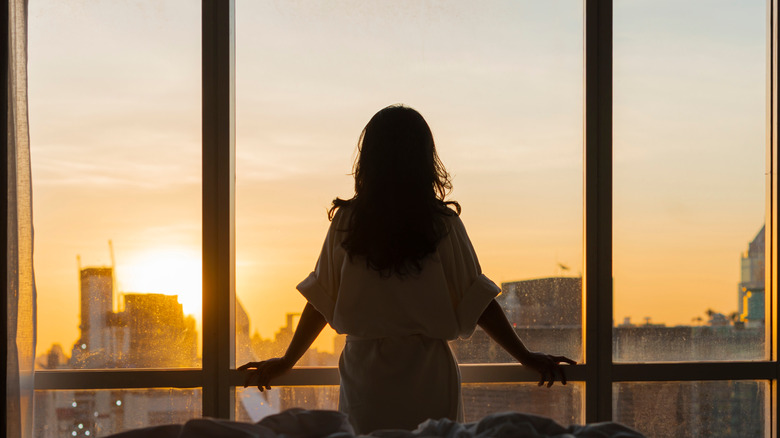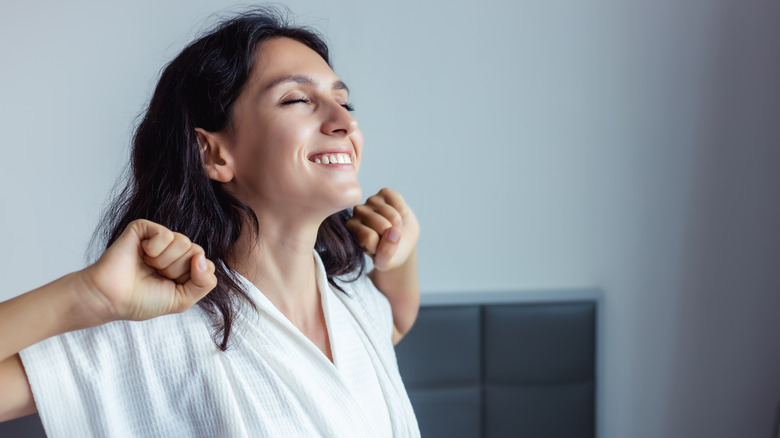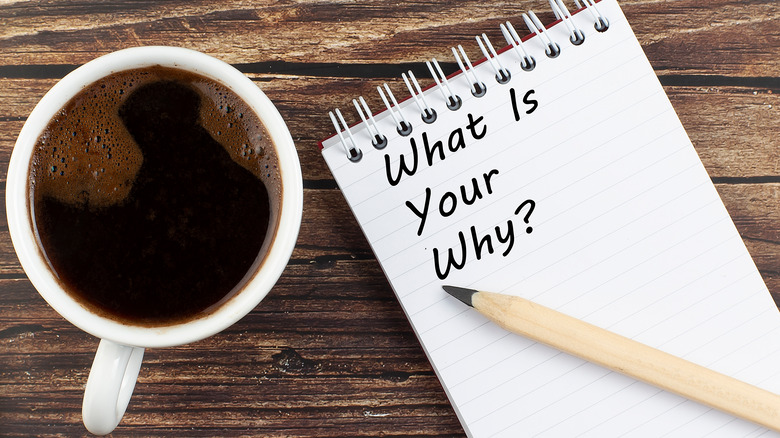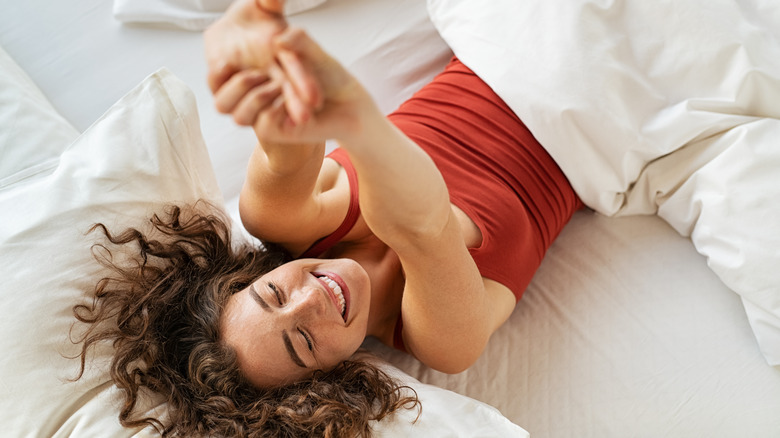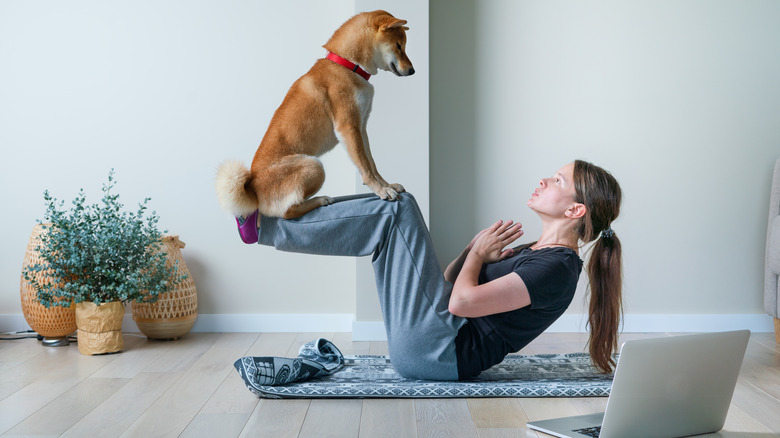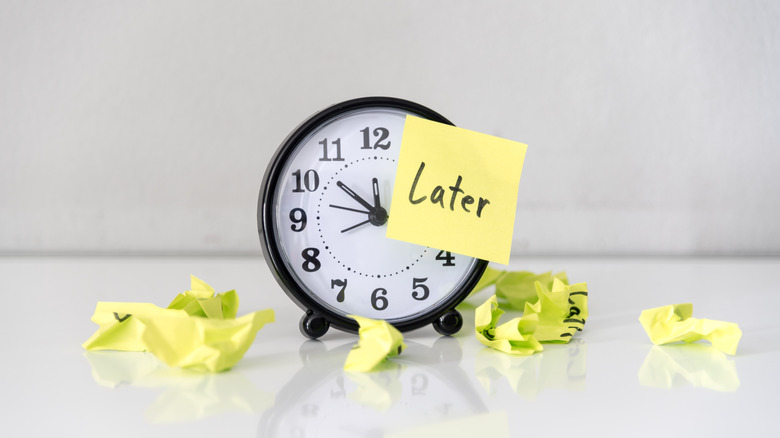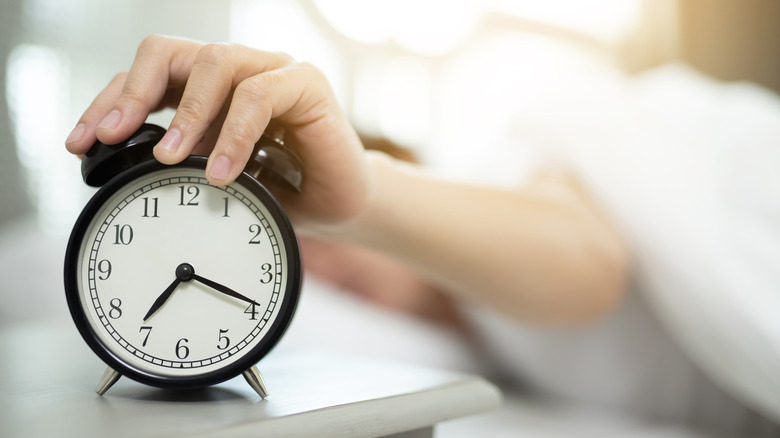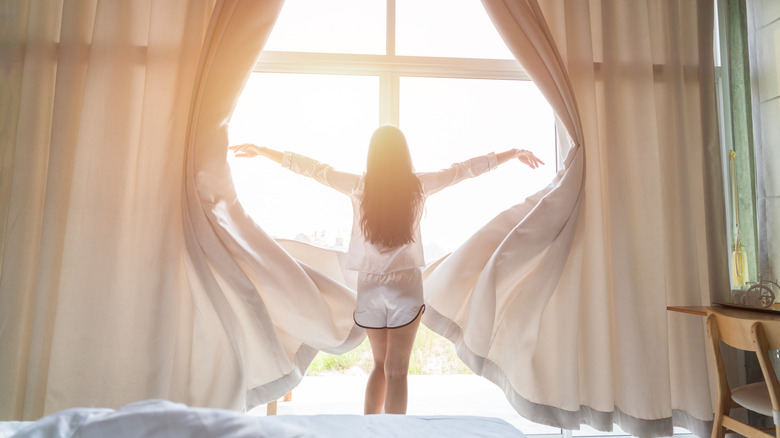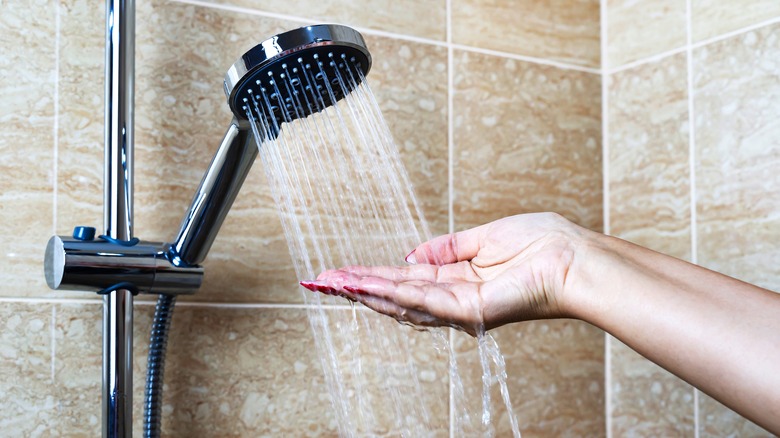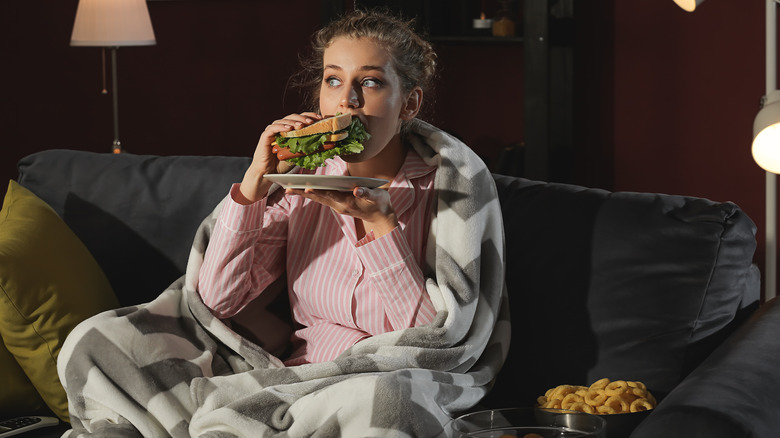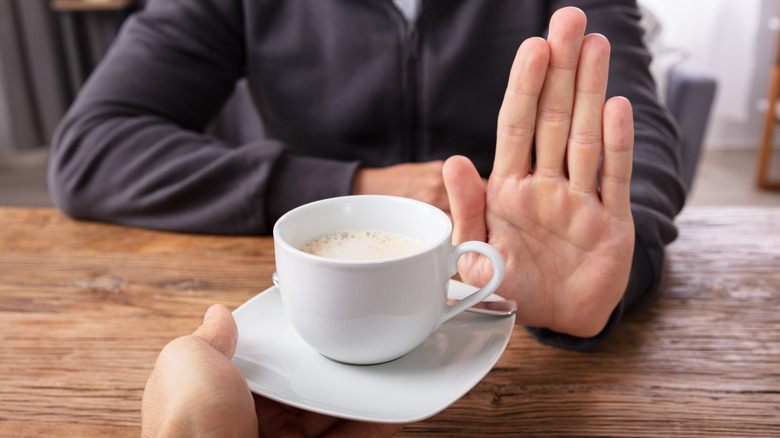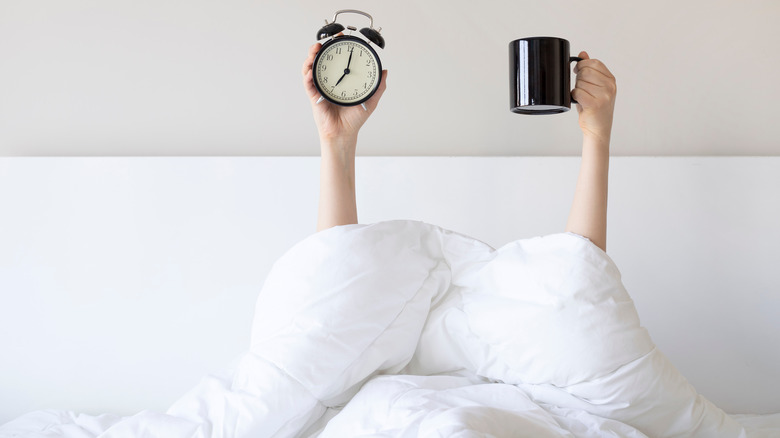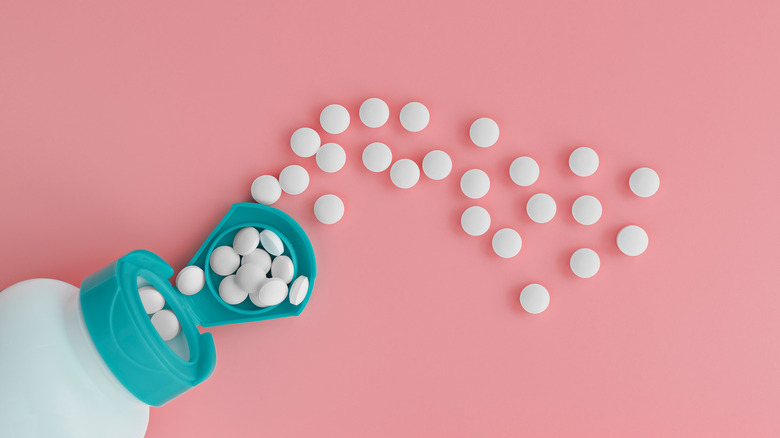14 Hacks To Wake Up Earlier And Stick To It
If you're like most people on planet earth and don't usually wake up all bright-eyed and bushy-tailed and ready to attack the day, you've probably had some pep talks with yourself over the years about how you should get up earlier so your mornings aren't one big blur of rushing to be on time for all your responsibilities.
Getting up earlier than you're used to is hard, but it's not impossible. It's all about gradually making small changes until you reach your goal. If you usually get up at 7 a.m., setting your alarm clock for 5 a.m. and expecting to wake up feeling refreshed is a fantasy that will soon dissipate the moment that alarm goes off. You'll likely feel as if you've been hit by a ton of bricks and snooze until 7 a.m., feeling like a failure for doing so, only to repeat the process again the following morning. Sound familiar? Don't fret. We've put together 14 hacks to wake up earlier and stick to it — for real this time.
1. Consider the benefits of waking up earlier
The first thing you should do when you decide to take on the endeavor of setting your alarm clock for an earlier hour is to be aware of the benefits you'll be reaping. This will serve as great motivation when all you want to do is hit snooze.
A study published in the Journal of Sleep Medicine looked at the benefits of rising earlier and found that early birds actually go on to display higher levels of cognitive performance for the rest of the day. They're also less stressed and generally feel happier than those who hit snooze.
Andreas Michaelides, chief of psychology at Noom, told Byrdie that consistency and having a set sleep schedule you can actually keep up with is what's most important. Then you'll reap even more benefits, like having more energy throughout the day without constantly feeling like you need to take a nap. You also won't be getting those crazy sugar cravings, and you'll find that you're less likely to get really irritated with your co-workers or spouse. To top it off, your immune system will benefit too. All in a good night's sleep.
2. Have a strong reason for wanting to wake up earlier
You've probably heard this about exercise, but having a strong "why" for wanting to wake up earlier is just as important. Remembering that reason when all you want is to sleep in for five more minutes (which we all know easily turns into twenty) will be a great help in getting up when your alarm goes off — and continuing to do so every day.
Andreas Michaelides told Byrdie that it's important that people have a clear vision of why getting up earlier is important to them. "Ask yourself what it would look like to be more consistent in your sleep schedule and how that would benefit your life," Michaelides suggests, adding that writing it down could help you visualize it even better. He adds that this will be especially helpful when you start to lose motivation and need that extra bit of accountability to help you push through.
It's also wise to visualize what it will look like when you wake up earlier — this can go hand in hand with your "why." Seeing how much more time you have to do a quick workout, perhaps spend time with your kids and spouse, or simply drink your cup of coffee without rushing, can all help you when it comes to making a lasting change.
3. Make a conscious effort to shift your mindset
Andy Puddicombe, co-founder of the popular meditation app Headspace, says that rising early won't feel natural at first. In fact, it'll probably take a lot of effort. Getting over this hurdle is important, and your mindset holds the key. Puddicombe suggests you take stock of your inner dialogue and consciously change it to something empowering that'll help you leave the comfort of your bed earlier. Instead of telling yourself "I am not a morning person," change your inner dialogue to something like "I am becoming a morning person," Puddicombe suggests. You might be surprised at the impact this positive self-talk can have.
If you're someone who gets anxious trying to fall asleep when you know you need to get up early in the morning, a mindset change can help with that too. Victoria Albina, N.P., MPH, told mindbodygreen that instead of making yourself anxious by thinking of all the ways your morning could be derailed, repeat positive affirmations like "my body will get the rest it needs," or "the morning will be exactly what it will be, and I'm doing everything I can to make it wonderful." This can work wonders and help you get enough sleep so rising earlier is less of a struggle.
4. Establish a nighttime routine
Having a nighttime routine is crucial when it comes to waking up earlier. This is because it lets your body know that it's time for bed, according to the Sleep Foundation. The trick is to establish a very solid routine that you can repeat every night. Whichever activities you choose to add to your nighttime routine, try to perform them in the same order every night. This is an incredibly powerful cue to your brain that it's time to wind down and rest. Think of activities like reading your favorite book or taking a nice bath. You can also add other rituals like listening to music or doing some calming yoga or meditation. The possibilities are endless.
One thing you should not add to your nighttime routine is scrolling social media. A study published in Sleep Health shows that exposing yourself to too much light in the evenings actually ends up disrupting your sleep, making it harder to get up in the morning. If you want to read before bed, opt for a paperback instead of using your Kindle, and avoid watching TV or checking your phone.
5. Create a morning routine you look forward to
Nothing gets us out of bed as quickly as having something we really look forward to. That's where a morning routine comes in. They have been all the rage these days, and establishing one you look forward to is a great way to ensure you'll wake up on time.
Ellen Vora, M.D. told mindbodygreen that having something as simple as a nice cup of coffee or tea to look forward to when you first wake up can be a great help when trying to start your day earlier. There are many options to choose from — you can create a killer playlist with your favorite songs to blast first thing in the morning or prepare a delicious breakfast, as long as you know it'll help you get out of bed. The trick, Vora says, is reminding yourself how amazing these little rituals make you feel when you're tempted to hit snooze.
Keeping the benefits of a morning routine in mind can also help you when motivation to get up is running low. Ryan Howes, a clinical psychologist, told SELF that a morning routine helps to establish the tone for the rest of the day. He adds that the habits you create are likely to become second nature, which can actually help you to make better decisions regarding your self-care and general wellbeing throughout the rest of the day.
6. Use the right type of alarm
Nothing sucks quite as much as being jolted from a deep sleep by a blaring alarm. That alone can make you hit snooze in a hurry. There's actually a scientific reason why most of us dislike our alarms so much. Victoria Albina, N.P., MPH told mindbodygreen that it all has to do with something called sleep inertia. Commonly referred to as sleep drunkenness, this state is trigged in our bodies when we are jolted awake. Our brains dislike this way of waking, and with good reason: It's not natural. Albina explains that we are naturally wired to wake up slowly, and we should use alarms that allow us to do exactly that.
Ditch that toneless blaring you have set as an alarm on your phone and opt for something more melodious. A study conducted by the Royal Melbourne Institute of Technology found that opting for an alarm that resembles some sort of melody will actually avert sleep inertia. If getting up earlier is your goal and you know that your current alarm makes you feel anxious the second it goes off, consider changing the sound to something more melodic or invest in one that has a selection of pleasant sounds you can wake up to. You can even opt for alarms that mimic morning light for some extra assurance that you'll wake up peacefully.
7. Make it harder for yourself to hit that snooze button
Did you know that hitting snooze multiple times in the morning actually doesn't equal more rest? In fact, it can make you feel more tired, and you might notice that a groggy feeling accompanies you throughout the rest of the day. Ellen Vora, M.D. told minbodygreen that this is because your body can't go through a full sleep cycle again between snoozes, resulting in even worse sleep inertia.
A study published in the Journal of Sleep Medicine found that waking people up throughout the night had the same effect on their energy levels as getting only four hours of sleep, even though those participants got in a full eight hours. Experts say this same principle likely applies to those who keep hitting snooze in the morning.
So, the best thing you can do when you're trying to get into the habit of waking up earlier is to make it harder to hit snooze. The easiest way to do this is to simply place your alarm out of reach so you have to get out of bed to shut it off, Sleep.org suggests. Bustle also suggests investing in an alarm that actually forces you to move around in the morning in order to switch it off, ensuring that you're awake and no longer tempted to hit snooze by the time you manage to quiet it.
8. Make sure to let the sunlight in as soon as you wake up
Sunlight is the best alarm — a study published in Current Biology found that exposure to sunlight or any bright light in the morning can actually help shift people's circadian rhythm. This is especially true for night owls: The study found that those who tend to stay up late can greatly benefit from light exposure in the morning, helping their body's natural clock to slowly shift to an earlier wake-up time. Another study published by Frontiers in Neuroscience discovered that making sure you expose yourself to bright light in the morning is one of the best tactics to implement when your goal is to wake up earlier and become a morning person.
Sleep.org suggests opening up the curtains as soon as you wake (or you can leave them slightly open overnight so the sun can peek in before you have to wake up). During the winter months, you can opt to use dawn simulators, or if you have smart lights, use them in conjunction with your alarm clock so you'll be waking up to a light-filled room when your alarm goes off.
Another option is a light therapy lamp, which, according to Harvard Health, can even help alleviate the symptoms of depression while also making it easier to wake up. You can even invest in an alarm clock that simulates the sunrise to wake up more naturally (per Bustle).
9. Drink a cup of coffee
What is life without coffee? As it turns out, it's perfectly acceptable to reach for the coffeemaker first thing in the morning if your goal is to wake up earlier and, you know, feel moderately alive while doing so.
A review published in Neuroscience and Behavioral Reviews found that drinking between a half cup to three cups of coffee (or any caffeinated drink for that matter) can help people to feel awake and energized (via Livestrong). The reason coffee makes us feel more awake in the morning is simply because it tells your body to wake up, Michael Twery, Ph.D., director of the National Center on Sleep Disorder Research, told Livestrong. "Caffeine slows the accumulation of chemicals that promote sleepiness," Twery explained.
According to WebMD, caffeine also helps to increase your brain's dopamine and serotonin levels, which, in turn, helps you feel more energized and focused. If you're someone who is sensitive to coffee or simply doesn't like it, opt for something like green tea or traditional black tea. These drinks contain caffeine, along with other health-boosting compounds.
10. End your shower with cold water
We know that sounds rather awful, but hear us out. Depending on how hard you find it to wake up early, you might seriously want to consider this simple but genius tactic.
A study published in Medicine and Science in Sports and Exercise found that a shot of cold water can trigger your body's sympathetic nervous system, releasing hormones like cortisol and norepinephrine. This can make you feel more awake almost instantly.
Sleep specialist Michael Breus, Ph.D. told Livestrong that there's no need to take an entire cold shower; you can simply make the water colder during the last minute, adjusting it to a colder temperature every ten seconds. You won't be thinking of going back to bed afterward, Breus says. "Cold forces blood to shunt from your extremities to your trunk, which sends a danger signal to your brain — as if you were outside in the snow," Breus explains, adding that this kicks your body into survival mode, helping you to shake off the cobwebs of sleep.
11. Don't eat too close to bedtime
You've probably heard this before, but if your goal is to wake up earlier, you need to ensure that you set yourself up for success the night before. Eating too close to bedtime could leave you feeling uncomfortable or feeling symptoms like acid reflux, board-certified sleep medicine physician Dianne M. Augelli told Glamour. She suggests making sure you shift your dinner schedule so you don't end up eating too late at night. This will give your body enough time for the digestion process, ensuring a good night's rest.
A study published in Current Biology found that the times at which we eat can actually affect our circadian rhythm. Another study published in the International Journal of Environmental Research and Public Health backs this up, with its findings showing that night owls typically tend to eat meals later in the day. Taking the findings of both studies into account, this means that a night owl can possibly shift their circadian rhythm to that of a morning person by doing something as simple as starting to eat dinner at an earlier hour.
12. Avoid drinking any caffeine in the aftternoon
While grabbing a cup of coffee in the morning can actually help you to wake up earlier, the same cannot be said for late afternoon coffee breaks. A study published in the Journal of Clinical Sleep Medicine found that if you consume caffeine six hours before your designated bedtime, it will have a negative effect on the amount and quality of your sleep.
In an article for Psychology Today, Michael J. Breus, Ph.D. explains that just because people don't notice a difference in their sleep when consuming caffeine late in the afternoon, it doesn't mean that it's not having an effect. The aforementioned study showed that caffeine can be interfering with your sleep behind the scenes without you necessarily realizing it. If you want to hit snooze in the morning even though you've had eight hours of sleep, that late-afternoon caffeine fix might be to blame.
Breus recommends you don't consume any caffeine after 2 p.m. to ensure your sleep quality is the best it can be.
13. Stick to your sleep schedule, even over weekends
If you struggle to wake up early, chances are that you probably don't have a consistent sleep schedule. If you typically get up at 7 a.m. on weekdays but sleep in until 10 a.m. on weekends, your body's circadian rhythm is probably out of whack, making it that much harder to wake up earlier.
Michael Twery, Ph.D. told Livestrong that our bodies are designed to work in cycles. "When the timing of these cycles is off, it's like an engine that doesn't run well, and you will struggle to wake up," he explains. That terrible groggy feeling you have on Monday that seems to continue for the rest of the day is called social jet lag, board-certified sleep medicine physician Dianne M. Augelli told Glamour. Another sleep specialist, Claire Kenneally, M.D., advises that people sleep in for no more than 30 minutes over weekends and avoid taking naps to keep their body's circadian rhythm on track. And if getting up at 5 a.m. on weekends sounds dreadful to you, you might want to reevaluate your ideal wake-up time. Consistency is key when it comes to reaching your goal to wake up earlier.
14. Try taking a low dose of melatonin to help you fall asleep earlier
If your goal is to wake up earlier but you struggle to fall asleep at night, you could benefit from taking a low dose of melatonin to help along the process, Healthline reports. Also known as the sleep hormone, melatonin is produced naturally by our bodies. If you struggle to drift off into dreamland at night, low melatonin levels might be to blame. Information from the National Library of Medicine shows that some of our daily activities could affect melatonin production. Consuming too much caffeine, smoking, or even drinking alcohol could all have a negative impact on your body's ability to produce enough melatonin. Blue light, which we're exposed to constantly via our computers and cellphones, is also a common culprit.
A study published by Frontiers in Neuroendocrinology found that taking a melatonin supplement can be helpful to people who suffer from sleep disorders. Not only can it help you fall asleep, but it can also help you sleep longer. Healthline suggests starting with a very low dose and gradually increasing it until you notice a difference. It's also important to discuss it with your doctor first. Taking a melatonin supplement can be a game-changer if your inability to fall asleep at night is messing with your goal to wake up earlier.
